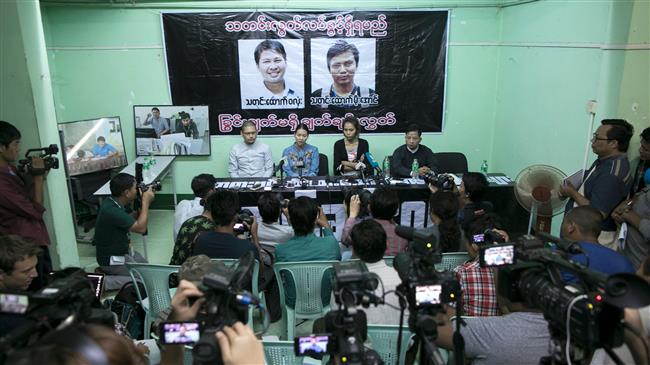Reuters says journalists arrested by Myanmar over massacre story
The Reuters news agency has confirmed the long-held view that two of its journalists who have been detained by Myanmar were taken into custody for covering state-sponsored violence against minority Muslims in the Southeast Asian country.
Reuters confirmed on Friday that when police arrested investigative journalists Wa Lone, 31, and Kyaw Soe-oo, 27, they had been assigned by the agency to cover the story of a massacre of Rohingya Muslims by Myanmarese soldiers and Buddhist mobs at a village in the northern Rakhine State.
The duo got arrested by police on the outskirts of Yangon on December 12 last year during a meeting with a police, who claimed to have information of interest in what appears to have been a set-up.
Police claimed the journalists, who are both Myanmarese nationals, were in illegal possession of classified official documents violating a colonial-era law. Those documents were given to the journalists by the police officer at the dinner meeting.
Myanmar has faced global outcry over documented atrocities against the minority Rohingya Muslim community — including rape, torture, and murder — in its western Rakhine State.
Myanmarese soldiers and Buddhist mobs have been waging what is commonly believed to be an ethnic cleansing campaign against the Muslims.
Government troops have forced nearly 700,000 Rohingya to flee the affected areas since last August.
Myanmarese authorities, who deny any abuse is taking place, have cut off Rakhine, barring independent media from accessing the zone. But the hundreds of thousands of refugees who have survived the campaign of violence and who have made it to neighboring Bangladesh have recounted their plight.
The Inn Dinn Village massacre
According to Reuters on Thursday, the news agency’s attempt to cover a massacre of Muslims by Myanmarese soldiers in Rakhine’s Inn Dinn Village on September 2, 2017 was the reason why its reporters were taken into custody.
Reuters on Thursday published a detailed report on the massacre.
According to that report, Myanmarese troops and Buddhist villagers executed 10 Rohingya men in Inn Dinn on that day before dumping their bodies into a mass grave.
The account was based on testimony from Buddhist villagers, security officers, and relatives of the slain men.
It included graphic photographs of the victims, with their hands bound, kneeling on the floor before being killed and of their bodies in a pit afterwards.
A month after the journalists’ arrests, Myanmar’s army issued a rare statement admitting that security forces took part in the extrajudicial killings of 10 Rohingya “terrorists” in Inn Din Village. But it vehemently rejected claims of systematic abuses by its security officers, despite a mounting volume of evidence pointing to atrocities.
Human rights groups and diplomats from around the globe have demanded the immediate release of the two journalists, who are scheduled to go to court on February 14 and face up to 14 years in jail.
VIDEO | Former FBI agent criticizes US Congress for 'outright corruption'
IRGC chief urges Muslim countries to cut aid routes to Israel
'New chapter in cooperation': Iran, Venezuela sign new MoUs
Jordan sentences former lawmaker for supporting Palestinian resistance
Basij volunteer forces hold massive drills in southwestern Iran
Israeli war criminals 'not welcome', US city says after ICC ruling
US vetoing of Gaza ceasefire resolution ‘disgraceful’: Iran’s UN envoy
VIDEO | IAEA adopts anti-Iran resolution tabled by E3












 This makes it easy to access the Press TV website
This makes it easy to access the Press TV website